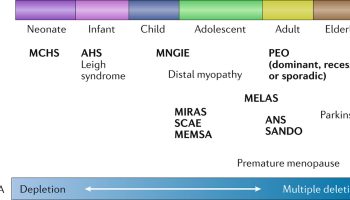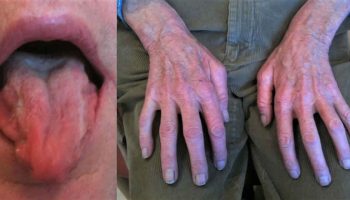Mal de debarquement syndrome
Mal de debarquement syndrome also known as disembarkment syndrome, literally means sickness of disembarkment, is a rare and poorly understood disorder of the vestibular system that most commonly develops following an ocean cruise or other type of water travel and less commonly following air travel, train travel, or other motion experiences 1. Patients whose onset was triggered in this way are categorized as Motion-Triggered subtype or onset group. However, Mal de debarquement syndrome can occur spontaneously or after non-motion events, such as childbirth, high stress, surgery, etc. Patients who were triggered in this way are categorized as being of the Spontaneous/Other (SO) subtype or onset group 2. The symptoms typically reported include: persistent sensation of motion such as rocking, swaying, and/or bobbing, difficulty maintaining balance, anxiety, fatigue, unsteadiness, and difficulty concentrating. The symptoms tend to be exacerbated when a patient is not moving, for example, when sleeping or standing still. Studies have shown that a brief period of these symptoms is common in healthy individuals after prolonged episodes of passive motion, normally lasting seconds to 3 days. However, in Mal de debarquement syndrome, significant balance impairment can persist for months to years. Symptoms may or may not go away with time; however, they may reoccur following another motion experience or during periods of stress or illness 2. The most common triggers are water-based activities such as ocean cruising. Less common triggers include airplane travel, extended landing travel and sleeping on water beds. Other common complaints of patients with Mal de debarquement syndrome include a sensation of uneven ground below their feet while walking, or feeling as if they are still on a boat. It is rare for Mal de debarquement syndrome patients to have true rotational vertigo or motion sickness.
The underlying pathophysiology of Mal de debarquement syndrome is unknown and there has been some speculation that the two onset groups are separate entities. However, despite the differences in onset between the subtypes, symptoms are parallel and a significant female predominance has been shown.
Recognition of Mal de debarquement syndrome as a clinical entity appears to be limited. Many health care providers still do not know about Mal de debarquement syndrome, how to diagnose it, or how to treat it. Mal de debarquement syndrome is primarily diagnosed by an otolaryngologist or neurologist using patient history (such as a recent boat, air or train travel or other motion experience) and the elimination of other disorders which may have similar symptoms.
A typical patient with Mal de debarquement syndrome sees over a dozen health care providers before arriving at a diagnosis 3. The burden of illness of Mal de debarquement syndrome has been measured as being comparable to multiple sclerosis and as expensive as migraine 4. There are no clinical tests like brain imaging or vestibular function testing that can diagnose Mal de debarquement syndrome, as these are overwhelmingly normal 5. Mal de debarquement syndrome has typically been diagnosed by the appropriate clinical history of oscillating vertigo, i.e., rocking, bobbing, swaying, that starts after a motion trigger has ended. Most cases are reported to improve temporarily with re-exposure to passive motion, such as driving a car or getting back on the boat. In this regard, it should not be confused with motion sickness in which the predominant symptom is nausea which occurs during the motion exposure itself 6.
Although there is no known cure for Mal de debarquement syndrome, there is evidence that some patients have responded positively to antidepressants or anti-seizure medications. Customized vestibular therapy and exercise routines may also be effective 7.
Is Mal de debarquement syndrome remission possible?
Yes. As a given course of Mal de debarquement syndrome progresses toward sustained remission, symptoms may become less severe and temporary remissions more frequent 8. Temporary remissions may occur as brief intervals, e.g., for hours, days, or weeks.
Mal de debarquement syndrome causes
The true cause behind Mal de debarquement syndrome is still unknown. Mal de debarquement syndrome likely results from the body’s balance system inadequately processing and adapting to multiple sensory inputs (visual, vestibular, proprioceptive and cognitive) from the environment once the stimulus (trigger) has ended. It is as yet undetermined as to the cause of the balance system’s inability to appropriately compensate and adapt. How or why this happens remains a mystery.
With regards to the pathophysiological mechanisms underlying Mal de debarquement syndrome, two main theories have been developed 9. In the first theory, Mal de debarquement syndrome is hypothesized to be the result of a maladaptation of vestibular ocular reflex (VOR) 10. The vestibular ocular reflex is subjected to adaptation depending on the context 11; for example, a cross-axis adaptation is present when traveling on a cruise ship, and a similar cross-axis re-adaptation will occur on returning to a static environment (i.e., land). However, in Mal de debarquement syndrome patients this mechanism seems to fail 9. This is further reviewed in 10. According to the second theory, Mal de debarquement syndrome is believed to be a disorder of abnormal functional connectivity. This theory was developed following findings from neuroimaging and neuromodulation studies on Mal de debarquement syndrome patients. According to these findings, Mal de debarquement syndrome can be considered as a disorder of oversynchronization of brain networks. This has been confirmed with Mal de debarquement syndrome patients responding favorably to neuromodulation 12, with the entorhinal cortex and amygdala as key neuronal areas 13.
Despite the formulation of these primary hypotheses to elucidate the underlying pathophysiology of Mal de debarquement syndrome, a unifying and clear theory has not been established. Similarly, it is still unclear why Mal de debarquement syndrome patients report symptom fluctuations 14, specifically, why female Mal de debarquement syndrome patients report an aggravation of symptoms during menses and ovulation 15. A new hypothesis has been recently formulated, where particular hormonal phases are suggested to play a role in influencing neurotransmitters that are potentially involved in Mal de debarquement syndrome pathophysiology 16.
Another important characteristic of this patient group to consider is the high prevalence of migraine 17. Symptom fluctuations in relation to female hormones have been previously described in Meniere’s disease 18 as well as in patients affected by migraine 19. Thus, the influence of ovarian hormones on Mal de debarquement syndrome symptomatology could be similar to the ‘estrogen-withdrawal theory’ that is well established in the pathophysiology of migraine in females 19. Similarly, when considering migrainous patients, between 55 and 90% report to have an improvement in symptoms during pregnancy, regardless of the type of migraine they suffered from 20. Hormones are able to alter neurological structure and functionality within the brain, and such changes have varied effects throughout the reproductive lifespan of a woman 21. These observations may be relevant when considering Mal de debarquement syndrome as a disorder of neuroplasticity, where ovarian hormones may influence or modulate brain functionality which consequently leads to symptom changes.
Mal de debarquement syndrome prevention
There is no known clinical study regarding the prevention of Mal de debarquement syndrome. Medication such as benzodiazepines might be tried prior to a motion experience if the disorder is related to inappropriate vestibular adaptation. For persons with a history of Mal de debarquement syndrome, it is suggested that they avoid further exposure to oscillating motion experiences, as many patients have reported reoccurrences. If this activity cannot be avoided, the use of benzodiazepines (such as valium) during the possible precipitating event may prevent the recurrence of symptoms. It is up to the individual who has had the mal de debarquement to determine if participating in the activity again is worth the risk.
Mal de debarquement syndrome symptoms
Symptoms of Mal de debarquement syndrome
Persistent sensation of motion and imbalance such as:
- Rocking
- Bobbing
- Swaying
- Staggering gait
- Fatigue
- Cognitive impairment
- Disequilibrium
Symptom intensity is highly variable among patients and may be quite disabling.
Patients are usually relieved when in motion, e.g., riding in a car.
Symptoms less frequently reported
- Sensitivity to light
- Dizziness
- Headaches
- Migraine Headaches
- Intolerance of busy patterns
- Loss of self-confidence
- Nausea
- Confusion
- Memory loss
- Ear pain and/or fullness
- Anxiety
- Depression
The primary symptom of Mal de debarquement syndrome is the persistence of a sense of motion and rocking. Some patients may experience fatigue, mood changes and confusion. Imbalance is a common complaint. Symptoms often increase when exposed to fast movements, flickering lights and grocery store aisles. There may be transient improvement in symptoms with re-exposure to passive motion, for example, riding in cars or trains. After completion of the trip, however, the symptoms tend to recur.
Studies have shown that the length of time one is exposed to a motion experience does not determine the severity or duration of Mal de debarquement syndrome, but most typical cases are triggered by day trips lasting several days.
Mal de debarquement syndrome diagnosis
The diagnosis of Mal de debarquement syndrome still remains mostly clinical and is primarily diagnosed by an otolaryngologist or neurologist using patient history. As such, the history is very important. Persistent “dizziness” after an ocean cruise, a sailing trip, a prolonged airplane flight or a cross-country road trip is highly suggestive of Mal de debarquement syndrome.
Diagnosis may also be made by your primary care provider or other health professional, physical therapists or audiologists for example, who recognizes the features of Mal de debarquement syndrome.
The answer to two questions determines the diagnosis:
- Did you recently ride on a ship, boat, train or other transportation?
- Do you still feel like you are rocking and swaying and the only time it stops is when you get back in a car, or boat or train?
Presently, there are no tests that can provide a definitive diagnosis of Mal de debarquement syndrome. However, your doctor will probably want to rule out other disorders that may have similar symptoms. Tests used to exclude other disorders may include the following:
- Neurological examination
- ENG test (electronystagmography)
- Videonystagmography (VNG)
- Rotary chair test
- Caloric Stimulation (air or water)
- Audiogram
- Blood tests (CBC, blood glucose, vitamin B12)
- Blood tests for autoimmune disorders that may involve the ear
- ANA (anti-nuclear antibodies)
- TSH (thyroid stimulating hormone)
- anti-microsomal antibodies
- anti-cochlear antibodies
- HLA-DR determinations
- MRI of the brain and/or MRA of the brain stem and neck
- Electrocochleography (ECOG) – if hearing is abnormal
- Posturography
- High resolution cat scan to rule out small fistulas or superior canal dehiscence syndromes, especially if history of barotrauma.
- Optokinetic after-nystagmus
It is common for test results to be entirely normal for people suffering with Mal de debarquement syndrome. Because of this, many patients commonly go undiagnosed or are misdiagnosed. Consult your physician to determine which tests are best for you.
Mal de debarquement syndrome treatment
Mal de debarquement syndrome is very difficult to treat, with little effectiveness of most treatments 22. Most drugs that work for other forms of dizziness do not work for Mal de debarquement syndrome. For example, anticholinergic medications that work for motion sickness and typical forms of dizziness, such as meclizine or scopolamine, are not effective in either treatment or prevention of Mal de debarquement syndrome. In some cases, medications classified as vestibular suppressants, such as anti-depressants and anti-seizure medications, may be used 23. Clonazepam at low doses once or twice a day has shown improvement in patients. Higher doses were not proven to be effective. Customized vestibular therapy like optokinetic stimulation has been effective in some cases 24. In recent years, a renewed interest in understanding the underlying cause of Mal de debarquement syndrome has led to new treatment options, including repetitive transcranial magnetic stimulation 25. More studies into these treatment options are needed.
Patients who do recover may be susceptible to recurrences of increased duration.
- Hain TC, Hanna PA, Rheinberger MA. “Mal de debarquement.” Archives of Otolaryngology: Head and Neck Surgery. 1999;125:615-620.[↩]
- What is Mal de Débarquement Syndrome? http://mddsfoundation.org/about[↩][↩]
- Mucci V, Canceri JM, Brown R, Dai M, Yakushin S, Watson S, et al. Mal de Debarquement Syndrome: a survey on subtypes, misdiagnoses, onset and associated psychological features. J Neurol (2018) 265:486–99.10.1007/s00415-017-8725-3[↩]
- Macke A, Leporte A, Clark BC. Social, societal, and economic burden of Mal de Debarquement Syndrome. J Neurol (2012) 259:1326–30.10.1007/s00415-011-6349-6[↩]
- Cha YH. Mal de Debarquement. Semin Neurol (2009) 29:520–7.10.1055/s-0029-1241038[↩]
- Golding JF. Motion sickness. Handb Clin Neurol (2016) 137:371–90.10.1016/B978-0-444-63437-5.00027-3[↩]
- Mal de Debarquement. https://rarediseases.org/rare-diseases/mal-de-debarquement[↩]
- https://mddsfoundation.org/symptoms/[↩]
- Mucci V, Cha Y-H, Wuyts FL, Van Ombergen A. Perspective: stepping stones to unravelling the pathophysiology of Mal de Debarquement syndrome with neuroimaging. Front. Neurol. 2018;9:42.[↩][↩]
- Dai M, Cohen B, Smouha E, Cho C. Readaptation of the vestibulo-ocular reflex relieves the Mal de Debarquement syndrome. Front. Neurol. 2014;5:124.[↩][↩]
- Cohen B, Yakushin SB, Cho C. Hypothesis: the vestibular and cerebellar basis of the Mal de Debarquement syndrome. Front. Neurol. 2018;9:28.[↩]
- Cha Y-H, Deblieck C, Wu AD. Double-blind sham-controlled cross-over trial of repetitive transcranial magnetic stimulation for Mal de Debarquement syndrome. Otol. Neurotol. 2016;37(6):805.[↩]
- Cha YH. Mal de Debarquement syndrome: new insights. Ann. N. Y. Acad. Sci. 2015;1343(1):63–68.[↩]
- Cha Y-H, Brodsky J, Ishiyama G, Sabatti C, Baloh RW. Clinical features and associated syndromes of Mal de Debarquement. J. Neurol. 2008;255(7):1038.[↩]
- Mucci V, Canceri JM, Brown R, et al. Mal de Debarquement syndrome: a retrospective online questionnaire on the influences of gonadal hormones in relation to onset and symptom fluctuation. Front. Neurol. 2018;9:362.[↩]
- Mucci V, Jacquemyn Y, Van Ombergen A, Van De Heyning PH, Browne CJ. A new theory on GABA and calcitonin gene-related peptide involvement in Mal de Debarquement syndrome predisposition factors and pathophysiology. Med. Hypotheses. 2018;120:128–134.[↩]
- Parker DA, Jennings SJ. Mal de Debarquement syndrome: review of an unusual cause of dizziness. Audiol. Med. 2008;6(3):228–232.[↩]
- Andrews JC, Ator GA, Honrubia V. The exacerbation of symptoms in Meniere’s disease during the premenstrual period. Arch. Otolaryngol. Head Neck Surg. 1992;118(1):74–78.[↩]
- Sacco S, Ricci S, Degan D, Carolei A. Migraine in women: the role of hormones and their impact on vascular diseases. J. Headache Pain. 2012;13(3):177–189.[↩][↩]
- Pfaffenrath V, Rehm M. Migraine in pregnancy. Drug Saf. 1998;19(5):383–388.[↩]
- Hoekzema E, Barba-Müller E, Pozzobon C, et al. Pregnancy leads to long-lasting changes in human brain structure. Nat. Neurosci. 2017;20(2):287.[↩]
- Cha YH. Mal de debarquement syndrome: new insights. Ann N Y Acad Sci. 2015 Apr; 1343:63-8. http://www.ncbi.nlm.nih.gov/pubmed/25726862[↩]
- Mal de debarquement syndrome. https://rarediseases.org/rare-diseases/mal-de-debarquement[↩]
- Dai M, Cohen B, Smouha E, Cho C. Readaptation of the Vestibulo-Ocular Reflex Relieves the Mal De Debarquement Syndrome. Front Neurol. 2014 Jul 15; 5:124. http://www.ncbi.nlm.nih.gov/pmc/articles/PMC4097942[↩]
- Cha YH, Cui Y, Baloh RW. Repetitive transcranial magnetic stimulation for Mal de Debarquement Syndrome. Otol Neurotol. 2013 Jan; 34(1):175-179. http://www.ncbi.nlm.nih.gov/pmc/articles/PMC3529198[↩]





